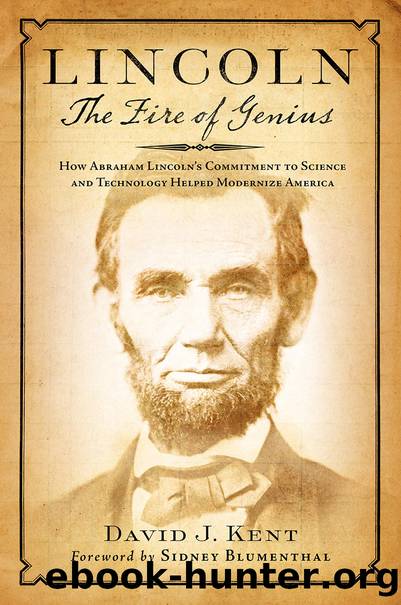Lincoln by David J. Kent

Author:David J. Kent
Language: eng
Format: epub
Publisher: Lyons Press
Published: 2022-05-27T00:00:00+00:00
WISCONSIN STATE AGRICULTURAL SOCIETY ADDRESS
âDiscoveries and Inventionsâ was a lecture that Lincoln âhad gotten upâ and took on the circuit. In contrast, his address before the Wisconsin State Agricultural Society in Milwaukee on September 30, 1859, was by request. Much of Lincolnâs address focused on refuting the dubious âmud-sill theoryâ promoted by South Carolina Senator James H. Hammond. Hammond had argued that for society to have an upper class, which was necessary for âprogress, civilization, and refinement,â a lower class was required to âdo the menial duties.â He likened this lower class to the bottom timber of a house, the mud-sill, which supports a building. Hammond believed that slavery provided this service more efficiently than the free-labor system of the North, which he averred was worse than slavery because workers were âfatally fixed in that condition for life.â They would labor forever without even receiving the âfreeâ housing provided by slave owners. Lincoln refuted this, using his own experience as a laborer risen to high station in life as an example of the progress any laborer could achieve.40
Lincoln also took on science and technology in this lecture. He reminded his audience that the chief use of agricultural fairs was to âmake mutual exchange of agricultural discovery, information, and knowledge,â the dissemination of what one may know to everyone. By sharing information on new inventions and techniques, all may benefit.
Avoiding the kind of pandering most audiences might expect, Lincoln offered some blunt guidance on the future of agriculture. His first suggestion was to expect âgreater thoroughnessâ in farming. Crop yields were much lower than capacity, he thought, noting that while a reasonable potential was fifty bushels of wheat per acre, the average crop in the wheat-growing regions was only eighteen bushels. To counter this, he pled for more intensive cultivation, not only as a means to increase food production but also for the psychological benefit of the farmer. âEvery man is proud of what he does well; and no man is proud of what he does not do well.â Those with their heart in their work âwill do twice as much of it with less fatigue.â Lincoln was encouraging farmers to work harder, but also smarter. He argued that while it would take more labor to âpush the soil up to something near its full capacity,â efficiency increases such that crop yields quickly outpaced the cost of additional labor. âDeeper plowing, analysis of soils, experiments with manures and varieties of seeds, observance of seasons and the likeâ would enhance profits because âthe same product would be got from . . . half the quantity of land.â Falling back on Euclidian language, he stated that âthis proposition is self-evident.â The statistical detail that Lincoln provided in the address with respect to crop yields reflected his avid study of agriculture.41 He advised farmers to abandon their old habits and employ new methods of plowing, crop rotation, and machinery while seeking to bring more science into agriculture.42
Lincoln also expands on his promotion of steam power begun in the âDiscoveries and Inventionsâ lecture.
Download
This site does not store any files on its server. We only index and link to content provided by other sites. Please contact the content providers to delete copyright contents if any and email us, we'll remove relevant links or contents immediately.
| Afghan & Iraq Wars | American Civil War |
| American Revolution | Vietnam War |
| World War I | World War II |
Waking Up in Heaven: A True Story of Brokenness, Heaven, and Life Again by McVea Crystal & Tresniowski Alex(37493)
Empire of the Sikhs by Patwant Singh(22772)
We're Going to Need More Wine by Gabrielle Union(18640)
Hans Sturm: A Soldier's Odyssey on the Eastern Front by Gordon Williamson(18330)
Leonardo da Vinci by Walter Isaacson(12809)
The Radium Girls by Kate Moore(11626)
Tools of Titans by Timothy Ferriss(7822)
Educated by Tara Westover(7693)
How to Be a Bawse: A Guide to Conquering Life by Lilly Singh(7160)
Permanent Record by Edward Snowden(5545)
The Last Black Unicorn by Tiffany Haddish(5417)
The Rise and Fall of Senator Joe McCarthy by James Cross Giblin(5151)
Promise Me, Dad by Joe Biden(4911)
The Wind in My Hair by Masih Alinejad(4849)
The Crown by Robert Lacey(4577)
A Higher Loyalty: Truth, Lies, and Leadership by James Comey(4555)
The Iron Duke by The Iron Duke(4125)
Joan of Arc by Mary Gordon(3787)
Stalin by Stephen Kotkin(3728)
